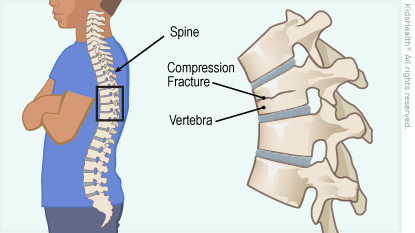Compression Fracture of the Spine
What Is a Compression Fracture of the Spine?
The
vertebrae
(or "vertebral bodies") are the bones that form the spinal column. A compression fracture of the spine describes a collapse of one or more of these bones.
How Do Compression Fractures of the Spine Happen?
Anyone can get a compression fracture of the spine from a serious fall or car accident. People with weakened bones can get them from a minor fall or without any trauma at all. Medical problems that cause weakened bones include
osteoporosis
and osteogenesis imperfecta.
What Are the Signs & Symptoms of a Compression Fracture of the Spine?
Someone with a compression fracture of the spine may have pain that happens right after an injury. Or they might notice back pain that seems to start without a known cause, but doesn’t go away. Sometimes people with a compression fracture of the spine do not have any pain at all.

Over time, a compression fracture can lead to loss of height and curving of the spine.
How Are Compression Fractures of the Spine Diagnosed?
To diagnose a compression fracture, health care providers talk to patients about their symptoms, do a physical exam, and get X-rays. Sometimes other imaging tests, like a CT scan or MRI, are done to get more information about the fracture and the areas around it. A bone density test may be done to learn more about the strength of the bones.
How Are Compression Fractures of the Spine Treated?
Treatment for a compression fracture of the spine depends on how severe it is and if there are other medical problems. Treatments may include:
- rest
- a back brace
- pain medicine
- physical therapy to strengthen the muscles that support the spine
- medicines, if there is a health problem causing weak bones
- surgery
When Should I Call the Doctor?
Call your health care provider right away if your child has:
- severe back pain that does not go away after taking pain medicines
- loss of feeling or "pins and needles" in the legs or feet
- trouble controlling his or her bladder or bowels
What Else Should I Know?
How a child heals from a compression fracture depends on how severe it is and what caused it. Help your child get the best result by going to all follow-up doctor visits, giving medicines as directed, and following instructions about which activities are OK and which to avoid.
